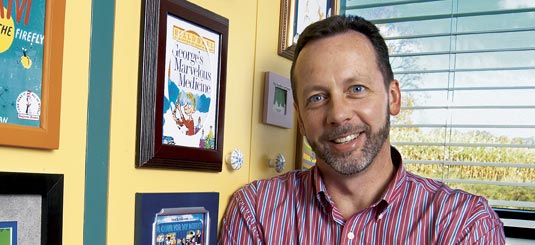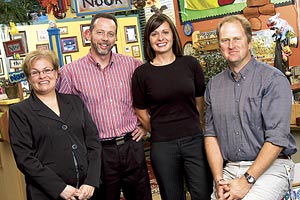
Steve Hammel – Teaching Success
Roch Carrier remembers Sister Brigitte

Teaching SuccessThe eight children who tumble into Steve Hammel's richly decorated classroom on Monday morning are immediately drawn to the eight stuffed animals and the mailbox that are sitting on the chalkboard ledge.Darryl's eyes light up as he asks if one is for him. Peter is eager to know what the mailbox is for.“You'll have to wait and see,” replies Hammel. “We need to start by reciting the mottos.”Please note: Students' names in this article have been changed. |
Prime Minister's Award-winning teacher Steve Hammel has taught Special Education at the Woodview Children's Centre in the Halton DSB since 1987. Since 2001 he has been part of a four-person Early Identification and Early Intervention Outreach (EIEIO) team – working with classes of eight students.
In Hammel's classroom this week, stuffed animals will play a vital role in teaching the unit on friendship to Darryl, Peter and their six classmates. Friendship is an important skill that these children will need to succeed in school and in life.
“These are troubled children and for the most part that's what interferes with their success at school,” explains Steve Kovar, a veteran child and youth worker (CYW) who works alongside Hammel.
The EIEIO program combines therapy and education. Students learn skills and strategies to cope with problems, manage anger and get along with peers and adults, while covering various aspects of the Ontario curriculum.
The curriculum component of the program is Hammel's bailiwick.
“We have grade-appropriate and individualized expectations for them,” he says. “It's reading, writing, spelling, math and problem solving. While it's important what the kids learn, it's more important that they feel good about learning. That's what they need to take with them.
“The key is to have a high likelihood of success, yet keep the work challenging.”
With creative hands-on activities, short and engaging writing tasks, student-centred and individualized activities and myriad props, these students take on work they could never have done before joining the program.
Many are bright and it doesn't take long for most to start experiencing some academic success.
When Scott exclaims, “I love this math!” team members smile at each other.
Integrated learning
Hammel says that the students' activities focus on literacy and numeracy skills, and that personal lessons are drawn from units whenever possible – using metaphors to link what they are learning to themselves.
For the unit on volcanoes, for example, the children learn how volcanoes are formed and erupt and they make models. They also talk about how their own anger can erupt – but they can control these eruptions, unlike those of the volcano. And this leads them to learn ways to control their anger.
The friendship unit, which Hammel will begin today, provides another opportunity for learning critical life skills.
In spite of the children's excitement about the stuffed animals as they enter the classroom, the established routine is maintained: the date is identified, the mottos are recited and the day's activities, always listed on the board, are reviewed.
Then Hammel explains that the children have a new friend, who has already chosen them – cleverly circumventing fights over the animals. And the animals, along with handwritten letters, are distributed.
“While it's important what the kids learn, it's more important that they feel good about learning.”
The students excitedly tear open their letters.
“He's a white tiger and his name is Stripe!” exclaims Julie.
Students read the letters to learn about their new friend and they prepare to write a response telling their new friend about themselves.
Hammel, Kovar and Melissa Mainolfi help the students jot down ideas, which will then be turned into sentences on paper. Peter is the first to drop his letter in the mailbox and asks with excitement, “Do you think Chico will write back?”
When the letters are written and posted in the classroom mailbox, there is a reward: making friendship necklaces.
Most of the children are slow to complete the letter-writing task and some become frustrated. Marcus must take a time out at the back of the room; Steve goes for a walk. Some refuse to participate. Melissa will not put pencil to paper. Kovar cajoles, encourages, insists – all to no avail. The promise of making a necklace does not motivate her. She seems to understand the task and have the requisite skills, yet she appears to be in another world.
The unit on friendship will continue this week and is integrated into much of the work. Each day the students will receive and write letters. Hammel is particularly fond of this unit, as it allows students to share details about themselves that they may be reluctant to talk about. Maybe tomorrow Melissa will write a letter to Stripe, and the letter may offer some clues.
Latch on to the affirmative
“This is a children's mental-health centre,” says Garry Stuart, executive director of Woodview Children's Centre. “Many of our kids have lost faith in themselves and this team is very effective at restoring it.”
“Like all good teachers,” says Hammel, “we focus on the positives and what these kids can do – not what they can't do.”
When asked for his advice he says that teachers and students must know their own strengths in order to work and learn in styles that best suit them.
“Success has to be authentic for each child,” he says. “Help them figure out what makes them feel confident and successful and make sure it's built into your program.”
 |
Social worker Laura Harper-Ciaramella, who provides family and individual counselling that supports students' work in the classroom, with teacher Steve Hammel and child and youth workers Melissa Mainolfi and Steve Kovar |
While Hammel certainly knows how to motivate, he also recognizes when to ease off. As the day draws to a close and the children get tired – it's story time.
The students are asked to sit quietly and put their heads down if they wish, but they must not stop others from enjoying the story.
He reads enthusiastically. With a stuffed dragon as a prop he often stops to ask questions, to recap and to ask the children to predict what will happen next. Those who give correct answers get to hold the dragon.
At the end of the students' day Caleb gets a bit teary as he realizes he is not allowed to take his animal home, and Hammel offers reassurance. “Buster will be here waiting for you tomorrow,” he explains.
When the students have gone the adults take a few minutes to catch their breath and then start in reviewing the day, sharing information and planning more opportunities for success for tomorrow.
Hammel's class mottos
Hammel's class has two mottos that students repeat each morning and adults reinforce throughout the day:
-
Feel better think smarter; think smarter feel better.
-
If I respect myself others may do the same. If I persevere I can succeed. If I give up I will fail. I can begin to solve problems if I share my ideas and feelings with those who wish to help. My future can be good if I work with others to make it that way. I cannot be perfect. I can only do my best. If I do my best good things can happen.”
The positive circularity of the shorter motto is reinforced when the students feel good as they succeed and are motivated to learn more, which leads to more success, and so on.
By the time they graduate the students will be able to recite the “mega-motto” from memory. The hope is that they learn to live it as well – carrying its messages into their future learning.
Engaging strategies
- Break things down into small learning chunks.
- Have students take work home to show parents what they are doing.
- Encourage students to read to their parents.
- Don't spend excessive time on any one activity, even if it's high interest.
- Build in variety.
- Always put the day's events on the chalkboard.
Early identification and early intervention
Woodview Children's Centre in the Halton DSB is an accredited non-profit children's mental health centre that provides residential, day, treatment and community support services to children, young adults and their families.
The Early Identification and Early Intervention Outreach program helps troubled children in Grades 1 to 4 who are experiencing severe social, emotional and behavioural problems. The intensive 20-week program is designed to address problems early in a student's schooling and to successfully reintegrate students into their home schools.
A multidisciplinary team combines the talents of a teacher, two full-time child and youth workers (CYWs) and a social worker who provides family and individual counselling.
The program requires that parents attend 10 morning therapy sessions with their children. “It is helpful for parents to see how their children interact with others and handle academics so they can learn to support them,” teacher Steve Hammel explains. Some must learn effective parenting and coping skills and the social worker and CYWs are invaluable resources.
Prime Minister's Awards for Teaching Excellence
The Prime Minister's Awards for Teaching Excellence recognize outstanding teachers who instil in their students a love of learning and help them excel and build successful futures. The awards are given annually to teachers who have achieved outstanding results with students, inspired them to learn and continue learning and equipped them with the skills and attitudes they need to succeed in our changing society and knowledge-based economy.
For more information or to nominate someone, visit http://www.edu.gov.on.ca/teachingawards/.






